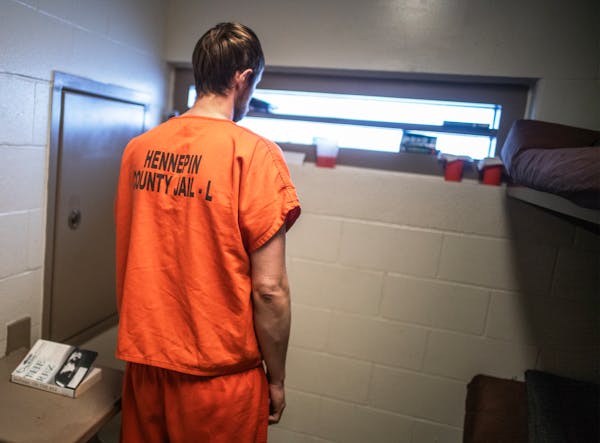A former Minnesota Department of Corrections employee has filed a lawsuit claiming he was fired after complaining that an enterprise was exploiting inmates for profit rather than preparing them for release from prison.
Nathan Delgado, a workforce development specialist, filed the lawsuit Monday in Ramsey County District Court against the department which oversees MINNCOR, a self-sufficient enterprise where inmates manufacture products to sell. MINNCOR also runs the Bridge program where Delgado helped inmates who were in halfway houses receive up to three months of job and interview training.
His lawsuit alleged he was fired in violation of the state's Whistleblower Act after raising concerns about inmates being moved back into MINNCOR production instead of receiving job training through the Bridge program. He is seeking unspecified damages in excess of $50,000. Delgado claims he has suffered continued personal and professional distress because of the lost work and job status.
"Delgado's role was to support and prepare these individuals for a life beyond incarceration," his attorney Naomi Martin said. "Instead, he found himself battling an institution more interested in exploiting their labor than investing in their future."
In a written statement, Corrections Commissioner Paul Schnell said, "We have not had an opportunity to review the lawsuit, and we do not comment on litigation."
Inmates who work for MINNCOR in production are paid between 50 cents and $3 per hour, the lawsuit states. MINNCOR is self-supporting and not a state enterprise. Last year, MINNCOR reported $42 million in operating revenue.
The Bridge program primarily teaches skills such as interviewing, resume writing and presentation. When not engaged in job-training programs, Bridge participants are required to work in MINNCOR's production operations.
Delgado, who was formerly incarcerated, was hired in February 2023 as a workforce development specialist in the Bridge program. He was to "provide advanced comprehensive job search preparation and goal setting for Bridge participants to increase their job readiness and reduce risk of re-offense" and to coach former inmates through the transition back into the community, the lawsuit said.
The lawsuit said Delgado did well, achieving a 98% success rate in helping participants find meaningful employment outside of MINNCOR. He was frequently praised and funding was renewed for his his role.
But Delgado's lawsuit said from the time he was hired, he was the target of hostility from MINNCOR staff who sought to undermine his authority.
A few months into his tenure, Delgado brought a partner organization to the Bridge program to speak about jobs. During the discussion, MINNCOR's production supervisor burst into the classroom, asked what was going on and sent three participants to the production floor, the lawsuit said.
At a later meeting to discuss what had happened, the production supervisor's manager stressed MINNCOR's need to get Bridge program participants on the production floor instead of in training. The manager said they wanted to take a couple guys early from Bridge training. According to the lawsuit, the production supervisor added, "You could take ten."
The manager said MINNCOR is a business and "we still need to pay the bills," the lawsuit said.
In another instance, according to the lawsuit, MINNCOR supervisors expressed frustration when Delgado helped an inmate of 30 years find a job paying about $32 an hour and requiring release from the Bridge program a couple weeks early. The inmate received early release, but Delgado was warned not to seek another early release because MINNCOR needs "bodies to do the contracted work MINNCOR is obligated to produce," the lawsuit states.
The lawsuit cited multiple other instances when Delgado reported concerning treatment of Bridge participants. In 2023, a supervisor told Delgado that "if you keep advocating for [incarcerated persons] over staff, I'm going to shut down Bridge."
Delgado, who is Black, also reported instances of suspected sexual assault by a supervisor at the halfway house and said he experienced race-based discrimination, according to the lawsuit.
In early 2024, Delgado said a new supervisor wasn't pleased with MINNCOR productivity and intended to "make an example" of a couple participants with the aim of getting others to fall in line. When Delgado raised concerns about the situation to supervisors, he was terminated Jan. 9 and has yet to receive a written, truthful explanation why, the lawsuit said.

How the Star Tribune is covering the 2024 election

Fact check: Walz and Vance made questionable claims during only VP debate

In Tim Walz's home city, opposing groups watch him debate on the national stage

